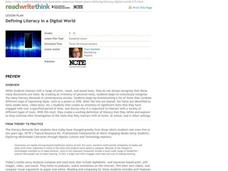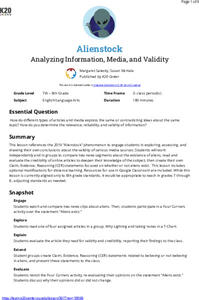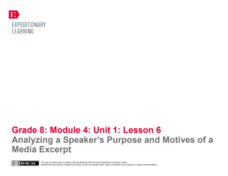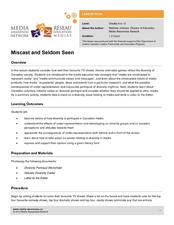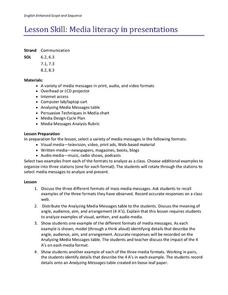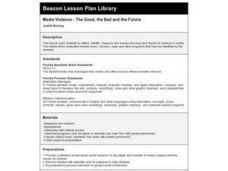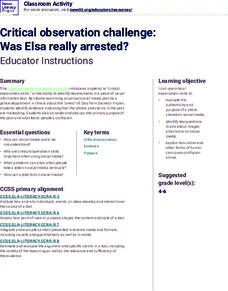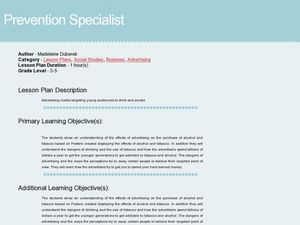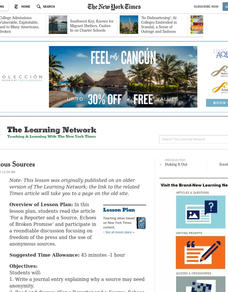ReadWriteThink
Defining Literacy in a Digital World
What skills are necessary to interact with different types of text? Twenty-first century learners live in a digital world and must develop a whole new set of skills to develop media literacy. Class members engage in a series of...
Newseum
The Fundamentals of News
A short video introduces middle schoolers to different media-related news terms. Viewers then complete a worksheet and discuss the differences between news and journalism, between facts and opinions.
K20 LEARN
Alienstock: Analyzing Information, Media, And Validity
One only has to watch MSMBC and FOX News to realize that media can present the same story in very different ways. Middle schoolers have an opportunity to test their ability to determine the validity and trustworthiness of information by...
EngageNY
Setting a Purpose for Research: Introduction to Media Literacy
What does that picture say? Young historians take a close look at a British advertisement from 1890 to determine the role of gender in advertising. They discuss the implications about women portrayed in the images. Pupils then further...
Media Smarts
Gender Messages in Alcohol Advertising
Make your students critical consumers of media, and foster an awareness of how culture is reflected and shaped by media. This resource covers how alcohol advertising presents and promotes gender stereotypes. After a discussion on...
EngageNY
Analyzing a Speaker’s Purpose and Motives of a Media Excerpt
Middle schoolers listen to a media clip of a teacher-selected speech and analyze it for speaker's purpose using a Speaker’s Purpose graphic organizer. Pupils pair up to discuss their completed organizers and add any new information they...
Curated OER
Miscast and Seldom Seen
Consider how well students' favorite TV shows, movies and video games reflect the diversity of society. The instructional activity introduces your class to several media literacy concepts, such as how media conveys values and messages,...
Prestwick House
Understanding Language: Slant, Spin, and Bias in the News
We live in a time of fake news, alternative realities, and media bias. What could be more timely than an activity that asks class members to research how different sources report the same topic in the news?
News For Kids
News For Kids.net
Media lovers read articles on a variety of current events with a website made especially for kids. The website is easy to navigate and includes sections about everything from science to sports.
Curated OER
Is the Media Part of the Story?
Students discuss the role of the media in public opinion. They use the internet to research when the media has had an impact on war. They write an essay about their research and any conclusions they have made.
Curated OER
Media Awareness: the Basics of Advertising
Students explore marketing techniques. In this media awareness lesson, students watch instructor-selected advertising and identify the marketing techniques used in each of them. Students then create advertisements for products.
Curated OER
Media Literacy in Presentations
Middle schoolers study the three types of mass media messages: visual media, written media, and audio media. After a class discussion which has them list examples of each, learners get into pairs and work on analyzing the "Four A's" in...
Curated OER
Media Violence - The Good, the Bad and the Future
Third graders define, identify, measure, and assess the level and impact of violence in media. The media forms evaluated include music, sitcoms, news, and other programs that are identified and shared by the class.
Curated OER
Radio News
Part of a larger unit from the Media Awareness Network on media literacy, this particular lesson plan focuses on the medium of news radio. Small groups participate in discussions on their radio listening habits as well as the...
Curated OER
Columbine Tapes: The Media's Right To Know
Students research the Columbine tragedy. They read about the media role of watchdog on the government. Students discuss and debate how the media has been involved in the latest release of Columbine videos and other material.
Newseum
Media Mix-Ups Through History: Analyzing Historical Sources
Scholars use the E.S.C.A.P.E. (Evidence Source, Context, Audience, Purpose, Execution) strategy to analyze a historical source to determine why mistakes happen in news stories. They then apply the same strategies to contemporary flawed...
News Literacy Project
Critical Observation Challenge: Was Elsa Really Arrested?
A 14-slide presentation showcases a social media post featuring Disney's Elsa from the movie, Frozen. The seemingly harmless post received lots of attention, raising the question, how do we know posts are factual? Scholars go through...
Curated OER
Advertising Media: Youth Drinking and Smoking
Scholars examine the effect of media and advertising on youth drinking and smoking. They determine what advertising means, how much money is spent on it, and how different age groups are targeted. They watch a movie and examine pictures...
Constitutional Rights Foundation
Understanding Fake News
Fake or fact? Learners must decide while looking at two published "news" stories. A reading about why fake news exists and a checklist on how to evaluate sources rounds out the activity.
Newseum
Media Ethics: Fairness Formula Starts With Accuracy
As part of a study of media ethics, young journalists apply a fairness formula to news reports. They look at accuracy, balance, completeness, detachment, and ethics to determine if the reporting is fair.
iCivics
Propaganda: What’s the Message?
As class members progress through eight fully prepared learning stations, they will identify how bias is present in persuasive media, as well as differentiate among types of propaganda techniques like bandwagon propaganda and the use of...
Curated OER
Anonymous Sources in the Media
When do people ask for anonymity? Why? After reading the New York Times article "For a Reporter and a Source, Echoes of Broken Promise," young readers participate in a roundtable discussion focusing on freedom of the press and the use of...
Curated OER
The Anatomy of Cool
Students explore differences between superficial and real "coolness," how marketers use cool to sell products, and how their own attitudes and perceptions are affected by media messages that reinforce specific messages about what...
Michigan State University
Researching and Compiling Survey Information
Bring Internet research and social issues to your language arts class in this activity. After investigating the topic "Media Violence and How It Affects Teenagers" on the Internet, middle schoolers work in groups to compile their...


